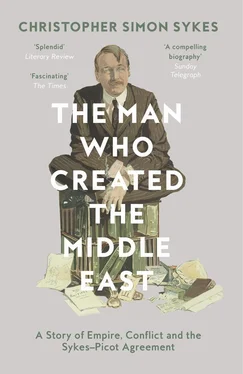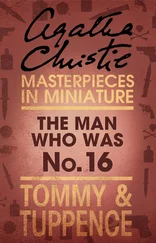Isá, who worked for the Jerusalem office of Thomas Cook, had a very poor opinion of most of his clients. Unlike the rich and cultured gentlemen he had encountered in the old days, who wore beards, could ride and shoot beautifully, and were liberal with ‘baksheesh’, ‘Now everything very different,’ he used to say. ‘Many very fat and wear rubbish clotheses; many very old men; many very meselable; some ride like monkeys; and some I see afraid from the horses. Den noder kind of Henglish he not believe notin; he laugh for everything and everybody; he call us poor meselable black; he say everything is nonsense and was no God and notin …’ 20
In the first week of their journey, the weather deteriorated by the day, with constant rain and hail storms, and eventually turning to snow, which got heavier and heavier until ‘the weather was too cold for camping, so I telegraphed to Damascus for a carriage to take me to Aleppo’. Eventually an ‘antique monstrosity’ arrived, drawn by four horses abreast. It was ‘enormously broad, with a rumble for baggage behind’ and ‘had the appearance of a decayed bandbox on a brewer’s dray; and, as I found to my cost, was extraordinarily uncomfortable’. 21Their first stop was at the village of Hasieh, ‘the most desolate and filthy little village that it has ever been my luck to visit’. The guest house consisted ‘of a large heap of offal with four rooms leading off it: the first and best was occupied by the cow; the second which was not quite so clean, was given to me; in the other two most of the villagers were gathered together to watch my cook preparing what he called “roast whale and potted hyæna”, that is roast veal and potted ham’. 22
It was a miracle that they ever reached Aleppo, considering that, in the early hours of one morning, the troublesome coachman made an attempt to sabotage the journey by deliberately overturning the coach. ‘The carriage fell on its side with a fearful thud,’ recalled Mark, ‘which was accompanied by a howl of terror from both the dragoman and the cook. The ensuing scene was not without a humorous side. The carriage opened and spat out a curious assortment of men and things on the scrub of the Syrian desert, and it was only when the cook, the bath, the medicine chest and the dragoman had been lifted off me that I was able to survey the scene of the accident. Its appearance reminded me exactly of those admirable pictures drawn in Christmas numbers of illustrated papers of Gretna Green elopements coming to grief in a ditch; luckily however no lady was present, for the language made use of, whether in Arabic or in English, was neither that of the Koran nor Sunday-at-Home.’ When they did finally reach their destination, he found it ‘not altogether a pleasant town’. The natives had a penchant for throwing stones at the hats of foreigners, and often had faces disfigured by ‘Delhi Boils’, which gave them ‘a most sinister expression’. Almost everyone he met, he wrote, who was not a native, ‘seemed to be trying to get away from the place, without success’. 23
Six days in Aleppo was quite enough. The party then struck out for Baghdad. Not a day went by without Mark being either amused or frustrated by the character of local people. ‘Their ideas of time and space are nil ,’ he noted. ‘If you ask how far away a certain village is, you may be told “one hour”, be the real distance anything from five minutes to twelve hours; or, when you are beginning to feel tired, everyone you ask during the space of a couple of hours may tell you that you are only “seven hours” from your destination. This is really … most annoying.’ At Meskeneh he got his first view of the Euphrates, which did not greatly impress him. ‘Its water is so muddy,’ he noted, ‘that it is impossible to see through a wine-glass filled with it.’ 24
Meskeneh was the first of a series of military outposts, manned by police or mounted infantry, which lined the high road from Aleppo to Baghdad. They were intended to help keep order in the valley, and to prevent the Anezeh Arabs from crossing the Euphrates, and it was at one of these that Mark now spent each night. When he finally reached the first bridge across the river at Falúja, the final stop before Baghdad, he was amused by what he found there. ‘There is a telegraph wire which crosses the river but there is no telegraph office; the only official in the place is the collector of tolls who dozes most of the day on the bridge; there are no troops; and there is no police station within twenty miles of the bridge. There is therefore nothing to prevent any number of people crossing it … Truly the ways of the Unspeakable are inscrutable.’ 25
After days of trekking through the desert, the approaching minarets of Baghdad were a wondrous sight: ‘the golden mosque appeared in the distance in the midst of a cluster of palm trees, and … the effect was very beautiful and inspiring’. Once within the city walls, however, although he was impressed by its cleanliness, Mark found little to inspire him, and after spending an enjoyable week staying with the English Resident, he was keen to be on his way to Mosul. Before leaving he penned a letter to Henry Cholmondeley. ‘I have had the most trying weather on my trip, the thermometer has varied in one month from 5º below zero to 90º in the shade, including fogs, snows, sandstorms + 1 week’s incessant rain am going up to Mossoul [ sic ] and thence to Batoum or Trabzionde [ sic ] but my route will depend on the state of the country Climactic & Political, it is useless to tell you all that has happened as it fills at least 30 pages of a diary, I can show you the faces of the people tho’ …
He signed the letter with his Arabic signature, adding the question, ‘How would this do as a check [ sic ] signature?’ 26
The journey from Baghdad up to the Russian border turned out to be full of incident, beginning with an encounter with some robbers north-east of Kerkúk. At the time he was travelling with a local governor, or Kaimakám , and his military escort, when they came under fire from some robbers: ‘just as we entered a kind of natural amphitheatre, about two thousand yards broad,’ he recalled, ‘I was handing him my cigarette case, when I was startled by the buzzing of a bullet somewhere overhead followed by the faint “plop” of a rifle on the hill side. I looked round but the kaimakám took a cigarette out of my case and lit it without saying a word. Two other bullets passed overhead and I made some remark about them; he merely said Sont des voleurs Monsieur , and it was only after five more shots had been fired that he took any further notice.’ Mark was impressed by the coolness of the man, ‘who seemed to think no more of the matter than a farm-boy would of crow-scaring’. 27
Approaching the town of Mosul, Mark was able to give further rein to his love of underlining the comic and exaggerating the grotesque. ‘The first thing that struck me,’ he wrote, ‘… was a splendid bridge. It is a fine piece of workmanship and has only one fault; it does not cross the river. The engineer commenced building it about a hundred and seventy yards from the bank; he built twenty-four piers, and at the twenty-fourth came to the water. Then after due consideration he thought that he would build the bridge with boats, and these he chained to the end of the masonry. Though this structure is useless as a bridge, it makes an excellent rendezvous for beggars, lepers and sweetmeat vendors.’ 28
The hardships of the journey increased after Mosul. They were constantly on the lookout for brigands, often mule-rustlers, and as they began to climb up into the mountains, the terrain became more treacherous, with rushing rivers and streams, non-existent roads and tracks that were impassable to anything but mules. It was bitterly cold, but the scenery was magnificent. ‘Overhead was a blue sky, below, the vegetation, such as it was, was green as an emerald,’ wrote Mark. ‘We were among high mountains, whose ruggedness was relieved here and there by clumps of stunted trees. There was snow on the peaks, and down the sides of the mountains streams rushed frantically … In one place we had to pass a very rickety patched-up bridge … Isá when crossing missed his footing and only by the greatest good luck I caught him by the band of his Ulster. Even now it makes me shudder to think of what might have happened to him; for there was a drop of forty feet into a river running like a mill race towards the mass of rocks over which it fell.’ 29
Читать дальше











